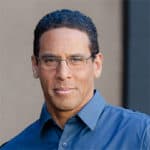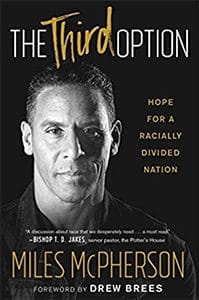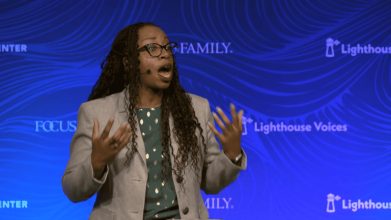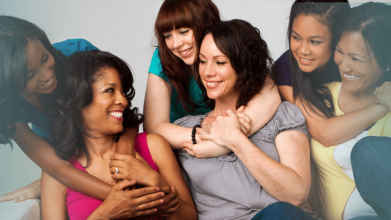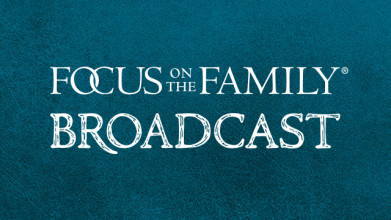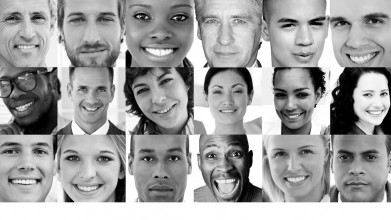Preview:
John Fuller: Today on Focus on the Family with Jim Daly, we reflect on the judgements that we tend to make based on the color of a person’s skin.
Miles McPherson: When you get a tan in Hawaii, it’s beautiful. You get a tan in the womb, it’s criminalized. When you get a tan in the womb, it’s scary. It’s inferior.
John: Today’s guest is going to encourage us to see God’s image in everyone. Your host is Focus president and author, Jim Daly, and I’m John Fuller.
End of Preview
Jim Daly: Well, as we commemorate the birth of Dr. Martin Luther King here in the US, uh, we thought it would be appropriate to share a message from Pastor Miles McPherson. Uh, Pastor Miles is passionate on the issue of race relations. Uh, he’s out there trying to make a difference and build bridges in racially divided communities across the country. As a former player in the NFL, Miles has personally experienced racism and has witnessed its devastating effects. Uh, so buckle up. We’ve got a fast-paced presentation ahead and I know you’ll be inspired, uh, to reach out to others across racial boundaries.
John: And now is Miles McPherson speaking at a conference on racial reconciliation at Seacoast Church in Alabama. And we’ll be diving in just after his opening remarks.
Miles: Ah, there’s a Japanese ancient art form called, Kintsugi. I was, probably pronounced it wrong. And in Kintsugi they take pottery that was broken and they bring it back together. They- they reassemble the pottery with gold and they take all the pieces and put the pottery back together and the belief is that the, uh, pottery that was repaired is more valuable than the original. Satan has done a amazing job at splitting us apart. And by the way, Satan’s the enemy. Not the white man, not the black man, not the poor, not the immigrant. Say amen, can I get a amen?
Audience: (Applause)
Miles: And Satan has done a great job of bringing o- o- of dividing us through different kinds of racism, personally mediated racism. One to another. White, black, Hispanic, Asian, it’s not a white, black thing only, it’s all of us. All around the world globally as well. Internalized racism where people start to internalize the message that they have been told. There are people who have been told that they’re less than and now believe it. And they hate themself and their own culture. Internalized racism. You might not have heard of that. And then there’s institutional racism. There’s systems designed to keep people in place.
The devil has done an amazing job of splitting us apart. But God-
Audience: (Laughter)
Miles: God- God, Jesus has this thing about bringing broken pieces together. Can get I get amen?
Audience: Amen.
Miles: He has this thing about making things that were ugly, beautiful. Broken, fixed. And he can’t do it and won’t do it except through us. We are his vehicle. It has to be us, but we have to do something different. We have to move past the optics of diversity. You can have wi- lots of colors and a- a- and nationalities in your church, and in your house, but then not in your heart. They could be in your room, but they’re not- you don’t have a ministry. You can have a diverse crowd, but not a diverse ministry. So we want to move past churches, ministries, into neighborhoods where they feel comfortable.
And all the neighborhoods that God has given them, don’t drive around, I ha- I had a prayer meeting in San Diego years ago and I intentionally put it in a black community and the head pastor’s driving there and they said, “We’ve never been to this part of town.” I said, “So you’re telling me you fly to Africa to minister to poor black people, but you won’t go 10 minutes straight down the street.” Amen. We have to get past where God says, “I’m going to call you to go wherever.” And by the way, if you’re a black church in a black community are you going to the Hispanic community right down the street? Or if you’re a Hispanic are you going to the black church? It’s all of us. Can I get amen? It’s all of us.
So we got to move past it. Let me give you some context of who I am and where I get this from. I have, uh, two black, uh, grandfathers from Jamaica, all my grandparents are from Jamaica. I’m not going to do this, though.
Audience: (Laughter)
Miles: I got 40 jobs, brother, 40 jobs. All right. A- and I got, I… (laughs) Two- two, both my grandmothers, all of my grandparents grew up in Jamaica. One grandmother was half Chinese, half black. The other grandmother was white. Her parents sent her from Jamaica West Indies. They didn’t want her to marry a black Jamaican. So they sent her Jamaica, New York, where she met a black Jamaican.
Audience: (Laughter)
Miles: I grew up in a black neighborhood. Went to school in a white neighborhood. Because of this tan color, I was too dark for the white people, so I got called all those names. I was too light for the black people, so I got called all those names. So that’s why I’m learning Spanish.
Audience: (Laughter)
Miles: My church is also as diverse as San Diego. My church is also as diverse as San Diego. We are leaning into this. Two years ago there was a shooting in San Diego. Uh, immigrant from Uganda was shot by a police officer. It was filmed. It was put on TV for a week, our city did this. And for a week the devil said, “You have to pick one of these sides. You have to be a- against the police or for the police. For the black community, against the black community.” The devil gave you two options. In every race conversation, the devil’s only going to give you two options.
And in those two options he’s going to say, you- you’re going to be on one side against the other, fighting the other, and you have to pick. There’s a third option. In Joshua, and I’m reading this real quick. In Joshua chapter five, Joshua was leading Jews into the promised land and says in verse 13, It came to pass when Joshua was by Jericho. Then he lifted his eyes up and looked and behold, a man stood opposite him with a sword. And Joshua said to him, “Are you for us or our adversaries?” A angel. You have to pick a side.
Are you on our side or you’re their side? And you say, “Uh-uh, homey don’t do that. Uh, I don’t pick sides. I am the side.” (laughs) So he said, he said, he said, “Are you for us or them?” He said, “No. This is not the INS here.” “Are you for us?” And he said, “No.” He said, “If you bow down,” I’m not going to read the whole thing. You bow down and worship. The only way you’re going to get into the promised land, if you honor and worship the presence of God in your midst. This is not about you, it’s not about you, it’s not about you. It’s about God. Can I get amen?
And so I’m going to talk to you about that because the third option is that we look at e- everyone single one of us. And by the way, save, or not save people. People you don’t like, people you have nothing in common with. Every single person. What do we have 100% in common? By the way, we’re all 99.9% genetically the same. I’m not even talking about that. White, black, Asian, rich, poor, you’re 99.9% genetically exactly the same, but you are 100% the same that God has given the same image to every single one of us. Amen.
Audience: (Applause)
Miles: And, the image of God has the responsibility to acknowledge itself in other people. The image of God has the ability to acknowledge itself in other people. The image of God has the ability to walk with God, run with th- like God, forgive like God, encourage like God, speak like God. We w- we do God a disservice when we are racist. Or when we look down on people because we are looking at the image of God in someone else saying, “Your image is inferior to my image.” When that’s not Biblical at all. That every single image is the same value because God can’t- God can’t look down on himself. He’s the same yesterday, today and tomorrow and he’s the same there, there, there, there, there, there, in every single one of us.
And so I want to talk about how we got divided, and here’s what I’m talking about, how we got divided and then how we can apply the third option to bring us back together. Sociologists call it, uh, call our division, uh, grouping. In-group, out-group. Uh, grouping is the way we sort people into either like me or not like me. This is a group, Christians, ministers, senior pastors is a group. Uh, uh, mega church senior pastors is another group. Women are a group. Men are a group. Youth pastors are a group. We’re all part of many groups.
And then when you are in part of a group, you are intimately involved and intimately knowledgeable about your group. Whatever group you’re not in, that’s called your out group. You don’t know intimate- intimate information about that. That’s why we make ignorant statements about people we don’t know about. We a- we say, those people. Because we don’t know and we’re ignorant, so we shouldn’t say anything. Bu- but that’s the out-group. But your in-group, you know all the intricacies of your in-group.
There’s a thing called, in-group bias. In-group bias is your tendency to give preferential treatment to the people of your in-group. I want you to think with me right now. And by the way, take this personal, but don’t take it personal. I- do you follow what I’m saying? Let the hi- spirit of God minister to you as we don’t think we’re going to get past this. In-group bias is when you look at people who are like you, whether it be pro- by profession, by race, by look, and you give them preferential treatment. I’m a going to give you a list of things and they’re going to go on the screen.
I am more comfortable with those like me. I am more inclined to spend time socially with those like me. I am more patient with those like me. I give the benefit of the doubt quicker to those like me. I express more grace given when mistakes are made to those like me. It is easier to communicate with those like me. I assume I will get along easier with those like me. I am more willing to get ou- I go out of my way to help those like me. I possess more positive assumptions about those like me. Say amen if that makes sense.
Audience: Amen.
Miles: Hey, y- we’re in Alabama, you got people coming, you got a guy walks into the room, “Hey, how are you doing? Hey, you know, I play for the, uh, for, uh, the football team.” “Oh, you’re all of a sudden part of my in-group. I’m a give you grace, come on in, how can I give, see you, hey, date my daughter, whatever you want to do. Everything’s cool.
Audience: (Laughter)
Miles: Y’all do that in Alabama? Y’all good. Out-group is the opposite. There’s out-group discrimination. Out-group discrimination is withholding in group bias against people.
Why? Because they’re not part of your group. I am less comfortable with those not like me. I am less inclined to spend time socially with those not like me. I am less patient with those not like me. I give the benefit of the doubt slower to those not like me. I express less grace when mistakes are made by those not like me. It is more difficult to communicate with those not like me. I don’t assume you’ll get along, I will get along with those not like me. I’m less willing to go out of my way to help those not like me. I possess less positive assumptions about those like me.
Listen, people say, “Well, I’m a racist or I’m not a racist.” You only got two choices. Here’s your third choice. Your third choice is you’re human and you can work a- better at being unbiased. But you could say, you know what, maybe I do give a little preferential treatment to people who look like me better than people who don’t, because I feel more comfortable with them. That’s fine. You may not have a white sheet or a whatever form or racism in your people, whatever your people are, express, all of us. But the out growth is if I walk into a room s- and someone’s going to give me less patience and less grace, I don’t care what you call it, it ain’t good.
Audience: (Laughter)
Miles: I- I had (laughs) I had a lady come up to me. She said, “Why can’t you just get over it?” I said, I said, “Here’s what I want you to do.” And I- and I created this thing called, um, the, uh, Walk in my Shoes field trip. I said to this white lady, I said, and she’s a dear friend. I’m lovin- love her to death. She speaks, God speaks to her through me. Okay. You can not know these things and be a really nice person. But then you need to learn.
I said, “Why don’t you go to a place where you are the only white person? Just for 10 minutes. Just try it.” She was, like, “Well, well, well…” She did it. She did it. And I had- had all these questions I want you to ask. I said, “I want you to tell me how you felt when I asked you. How you felt when you were driving there. How you felt when you were there. How did people treat you. Di- what you fear happened, did it happen? Duh, duh, duh.” A- and I wrote all this stuff down. And she would ask, uh, six people, by the way. And two of them said no. And one guy went on 10 minutes why he wouldn’t go. And actually, I actually had him write a paragraph to put in the book to tell why he didn’t want to.
He said, “You know what? If I- if I went to a black church, I would feel uncomfortable, like I had to leave right away.” That breaks my heart. And wh- wh- when people say, “Can’t you get over it?” I’m like, you have been living amidst your in-group. You flow in your in-group all day and night. You are getting preferential treatment over the out-group all day and night, so you don’t understand what it means to have that not like me all- or every day.
I want you to flip the script in this room. Most of the people in this room are white. I want you to flip it. I want you to make believe that all the people who are in this room that are white, are not white. And then all the people who are not white, are white. You all follow what I’m saying? And I wonder how many of you white people will come here. I wonder if you will register to come. Th- th- that’s not my crowd. Why? We’re here. We- we- we’re walking in the midst of our group. Huh, huh, are you all following what I’m saying?
That- that, you have to- you have to in your mind, uh, you have to in your mind think why, wha- how does that make me feel? Why does it make me feel that way? Because that’s where God can work. Does that make you a racist? Absolutely not necessarily. It just means, hey, I got, that’s something I can learn. You can go today and go someplace and say, “Listen…” And don’t think, don’t go automatically to, “I got to go to danger zone.”
Audience: (Laughter)
Miles: God put his image in all kinds of shades and in wonderful people. And- and because it’s an out-group, you may only have anecdotal information. And so you generalize and you see stuff on TV and someone told you this, but you have no personal experience. That’s the real relationship Pastor Chris talked about. Touch, hey, I’ll be here right after. Come touch me. Come touch me.
Audience: (Laughter)
John: You’re listening to Focus on the Family with Jim Daly and, uh, we’re hearing from Pastor Miles McPherson today. And you’ll find more insights into overcoming racial divisions in his book called, The Third Option: Hope for a Racially Divided Nation. We’ll send that to you for a gift of any amount today to the ministry. And we’ll include a free audio download of his entire presentation as well. Donate and request those at focusonthefamily.com/broadcast or call for details, 800-232-6459. That’s 800, the letter A, and the word FAMILY. Let’s return now to more from Miles McPherson.
Miles: Dr. Steven Jones of San Diego wrote this article called, The Right Hand of Privilege. Th- this country was designed for right-handed people, literally. Most people are right-handed. I’m left-handed. So, because I’m left-handed, I got to go (laughs) y- you know what I’m saying? W- who’s left-handed? Amen. Amen, okay. So, so, you do, you can’t just go get golf clubs at any place. You’ve got to go to a- you got to a extra store. You can’t get- get a mitt. When you’re at school, it’s right-handed desks. And you’re like this. And if I’m being- so y- y- you, you got to- you got to go through extra steps.
I want you to imagine if your in-group, just because, made of right-handed culture. But you’re left-handed. So you have to live in a right-handed culture. It’s no- it’s not the same. And so you’re walking in a right-handed culture and because you’re right-handed, everything was fun. Oh, the right-handed people go, “I don’t see the problem. I don’t see the problem. Everything fits. I can buy everything. I- I don’t know why, what you’re talking about? Wh- what are you worried about?”
Audience: (Applause)
Miles: And then someone come left-handed and say, “I- I can’t use that desk. I can’t- I can’t use that glove. I can’t use those gloves. I can’t- I can’t find a store. I got to go on Amazon and order. It won’t come here, it’s too far.” Four things I want to give you. Just to respect time, four things. Four things I want you to do. I- i- please, put these down, write these down. Rename everybody you see as your brother and your sister. Why? Oh, oh, listen, look at- look at what it says in J- i- in Matthew chapter- God hit me with this.
Matthew 22:37. You shall love the Lord, the God, with all your heart and all your soul and all your mind. This is the great… first and great commandment and the second is like it, you shall love your neighbor as yourself. Everyone say, neighbor.
Audience: Neighbor.
Miles: 1 John 4:20. If someone says I love God and hates his brother. Say, brother.
Audience: Brother.
Miles: Say, sister.
Audience: Sister.
Miles: If you say you’re a liar, for he does not, how does he not love his brother, sister? Say brother, sister.
Audience: Brother, sister.
Miles: Whom he has seen, but he can’t- how can he love God if he has not seen? Now, the Bible says clearly, you have to love your neighbor, your brother, as yourself. Can I get amen?
Audience: Amen.
Miles: No more, if you can’t do that, everything else is nullified. But what if they’re not your brother? What if you rename them? Oh, they’re not like you. They’re not all- they’re not like you. They’re down here.
We used to watch, uh, cowboys and Indian movies. They were always called the Indian savages. They weren’t people. They were down here. Blacks were called animals. Down here – even when they had the thing in Charlottesville, they were saying that – down here. So, if you’re not, if you call someone an n-word or a white privilege, or a illegal or a Arab, or whatever you call people, as soon as you do that, you give yourself permission not to love them.
Audience Member: Oh! That’s right!
Miles: Because you just changed their identification.
Audience: (Applause)
Miles: So therefore, I- I need to be your brother. Because the devil is the enemy, not me. And if you’re my brother, and the devil, y- you’re not my enemy, the devil is your enemy. Can I get amen?
Audience: (Applause)
Miles: Number two, number two. Number two. Give in-group love to your out-group. Next time you’re around people who don’t look like you and by the way, this applies to all kinds of stuff. It’s just the Bible. Next time, all kinds. (laughs)
Next time you’re in a place and you see someone that’s not like you and by the way, they may be the only one not like you in the whole room. Black, white, Hispanic, Asian, you may be the minority and there’s a one white person, one Hispanic person. G- give them the same grace that you give your people. Think about that.
Number three. (laughs) See my color. Stop saying you don’t see color.
Audience: (Applause)
Miles: Hey, hey, when you go out and get a tan, I go to Hawaii every year, I get a tan. Yes, we tan. I get a tan in Hawaii. And it looks really good. I get a tan a- and I ask you ladies, do you get a tan, you’re dating a guy, you want to date a guy, you get a tan, and you come to work and you spend five days in Hawaii, get your brown on, and then you come with your little spaghetti strap and you’re walking around work saying, “See my brown, see my brown.”
And for five days the dude you’re trying to getting attention to, says nothing about your tan. And you’re like, is it, do you not see my tan? And he says to you, “I don’t see color.” That ain’t happening. When you get a tan in Hawaii, it’s beautiful. When you get a tan in the womb, it’s criminalized. When you get a tan in the womb, it’s scary. It’s inferior. I am not saying that all y’all think that. I’m saying this is the difference. When you say you don’t see color, you are nullifying not only the color, but the burden that comes with the color.
You- you’re nullifying the experience of being in the out-group. And so i- if you say, and when people- when the first people say that to me, say, “I don’t see your color.” I was, like, I- I really thought they didn’t see red, green, brown. I was, like, this- that’s so sad. Everything’s gray. I- I don’t get it. I didn’t understand. And they were like, “No, no, no, no. I- I don’t see your color.” And I was like, “Well, well, how do you know even to say that to me if you don’t see it?”
So I- I’m- I’m confused. So then is said, “Well, what color am I?” I mean, am I, did you know if you like you? I want to be like me. And I want you to be like you. I was watching Sanford and Son. Sanford and Son (laughs). You all know Sanford and Son? Oh, my goodness.
So Redd Foxx was a comedian, African American comedian, and he was raunchy, and he was- he was just hilarious. But he had a show that was on TV, so it was relatively clean, and he was a junkman in South Central Los Angeles and there were two cops who always came to the house. One cop was black, one cop was white. And- an- and the black cop, had to only interpret to the white cop what Freddy was saying. It’s hilarious. It’s great, it was hilarious. And the white cop was very formal and he would talk straight and- and he was saying, uh, “So, someone robbed Fred Sanford’s house.” And he said, um, uh, “Mr. Sanford, was the perpetrator colored?” And he goes, “Yeah, he was colored white.”
Audience: (Laughter)
Miles: The devil says you have two options. White people and people of color. God says, no, no, no. I made all y’all colored. And I made all y’all colored to be beautiful. Everyone say, I am beautiful.
Audience: I am beautiful.
Miles: End of story. You white people are beautiful, you black people are beautiful, you brown people are, everyone’s beautiful. That’s it.
Audience: (Applause)
Miles: Fourthly, give me your heart. And then when I say me, let’s give each other our heart. Um, Rod Carew was a Panamanian baseball player. He’s old already, so a lot of y’all might not know him, but, um, he was Panamanian. If you saw him on the street, you’d think he was black, so he was a black Panamanian.
He had a 328 batting average, th- three thousand hits, 18 time All Star. Rookie of the Year. He was the man, he was the man. A- and I grew up on Rod Carew. Um, when he was 71 he had a heart attack and he needed a heart and a kidney. At the time there was a 27-year-old white tight end NFL, played at Stanford, uh, named Konrad. And Konrad had went into a coma. And Konrad, in a coma, his mother put he- her head on his chest, says, “Baby, you’re going to get up one day. I’m going to see your heart again.”
Well, Konrad died. And right before Konrad died, he gave his body, his organs to be donated. And Rod Carew got his heart. So Rod Carew calls Konrad’s mother. Konrad’s mother calls Rod Carew, “You have my son’s heart.” Rod Carew says, “Do you want to come listen to your son’s heart?” He goes over to the house and she puts her head on his chest, hears her son’s heart again. When Konrad was 11 years old, he met Rod Carew. And he came home and said, “Mom, I’m going to be a professional athlete, because I met my hero.”
How is it that a white man’s heart can be in a Panamanian black man if we’re so different? I’m going to end with a story. Let me end with a story.
Audience: (Applause)
Miles: There was a guy who was hunting in the woods and he saw this monster coming at him. And the monster was a hundred yards away and he was trying to get a good shot, and he kept getting closer and closer. He was behind a tree, he was behind a rock, he was behind a tree, he was behind a rock. And he said, I can’t, this thing’s going to kill me. I got to shoot it and the next thing you know, the monster was right here and he realized it wasn’t a monster. It was his brother.
There’s no monsters in here. There are people who do bad things and by the way, they look all kinds of shades. But we’re not monsters. And when I say, we, we, God made us in his image so we can honor him and glorify him, love like him, encourage like him, speak life like him, into himself and other people. And if we can understand and realize and see each other as brothers and sisters and that we are all one family, then God can bring this broken, fractured nation back together. The Lord Jesus, thank you so much for your faithfulness. Thank you for your goodness. We honor you and praise you, in Jesus’ name. Amen. Thank you very much.
Audience: (Applause)
John: Pastor Miles McPherson getting a standing ovation there from pastors and other leaders who are gathered at a racial reconciliation conference in Alabama.
Jim: What a passionate plea for unity and, uh, Pastor Miles is right on the money when he asks each one of us to see God’s image in our neighbor, no matter what their color. Uh, how could we do any less? And over the past few years, I’ve become much more aware of this issue. And here’s what it really gets down to. We need to open our hearts and minds to what other people are experiencing. It doesn’t have to be a Latino, a black, white issue. It’s just what are they encountering in the culture and understanding it.
Uh, for example, we had a board member, an African American man, and he was explaining to me, the phrase, Driving while Black. I didn’t know what he was talking about. And he said, uh, this is when you have boys in the black community, you have to sit them down and explain to them, okay, this is what’s going to happen to you. You’re going to get pulled over and when it happens, you put your hands on the wheel, you don’t reach for anything.
An officer will come up to the driver’s window and you need to be extremely respectful to them. And I said, “Well, why is that different from other people being pulled over?” And he said, “Because we tend to be more targeted.” He said, “I own an old beat up pick up truck that I use around the acreage we have. And I also own a Mercedes.” He was a former executive with IBM.
John: Mm-hmm.
Jim: And he went on to say, “I never get pulled over in the old truck, because it fits the stereotype. But when I’m in my Mercedes, officers will pull me over because they think maybe I’m a drug dealer or something else.”
John: Mm-hmm.
Jim: And I was dumbfounded. Uh, as a white guy, I’m sitting here thinking, this is a challenge I’ve never experienced. But as a Christian, it should bother me that that’s the treatment.
John: Yeah, that’s something that is foreign to me. I can’t imagine having to have that kind of a conversation with my boys.
Jim: Well, right. And I know some are going to say, “Jim, that’s, uh, baloney.” But folks, this is the point. Open your ears. Listen to other people’s viewpoints-
John: Mm-hmm.
Jim: … and experiences. We need to better understand one another and I think when we do that, we actually build a bridge. And we have empathy. And we are expressing the very commandment that Jesus gave us. And that is to love your neighbor. And that’s what’s most important. The best way to follow up on this message, in my opinion, is to get a copy of the book by Pastor Miles McPherson called, The Third Option: Hope for a Racially Divided Nation. Uh, get your copy directly from Focus on the Family for a donation of any amount and we’ll include a free audio download of this outstanding message. So please join us in ministry today.
John: Yeah, you can donate online and request your copy of The Third Option by Miles McPherson at focusonthefamily.com/broadcast. Or call us, 800-232-6459. 800, the letter, A, and the word, FAMILY. Next time, we will hear from Kathy Lipp as she shares her adventure of what she calls, accidental homesteading and how it changed her life.
Preview:
Kathi Lipp: Our relationship with God and with others looks radically different. Whereas we might go out to dinner with friends before, now they’re coming for a weekend. And we can talk deeply.
End of Preview










